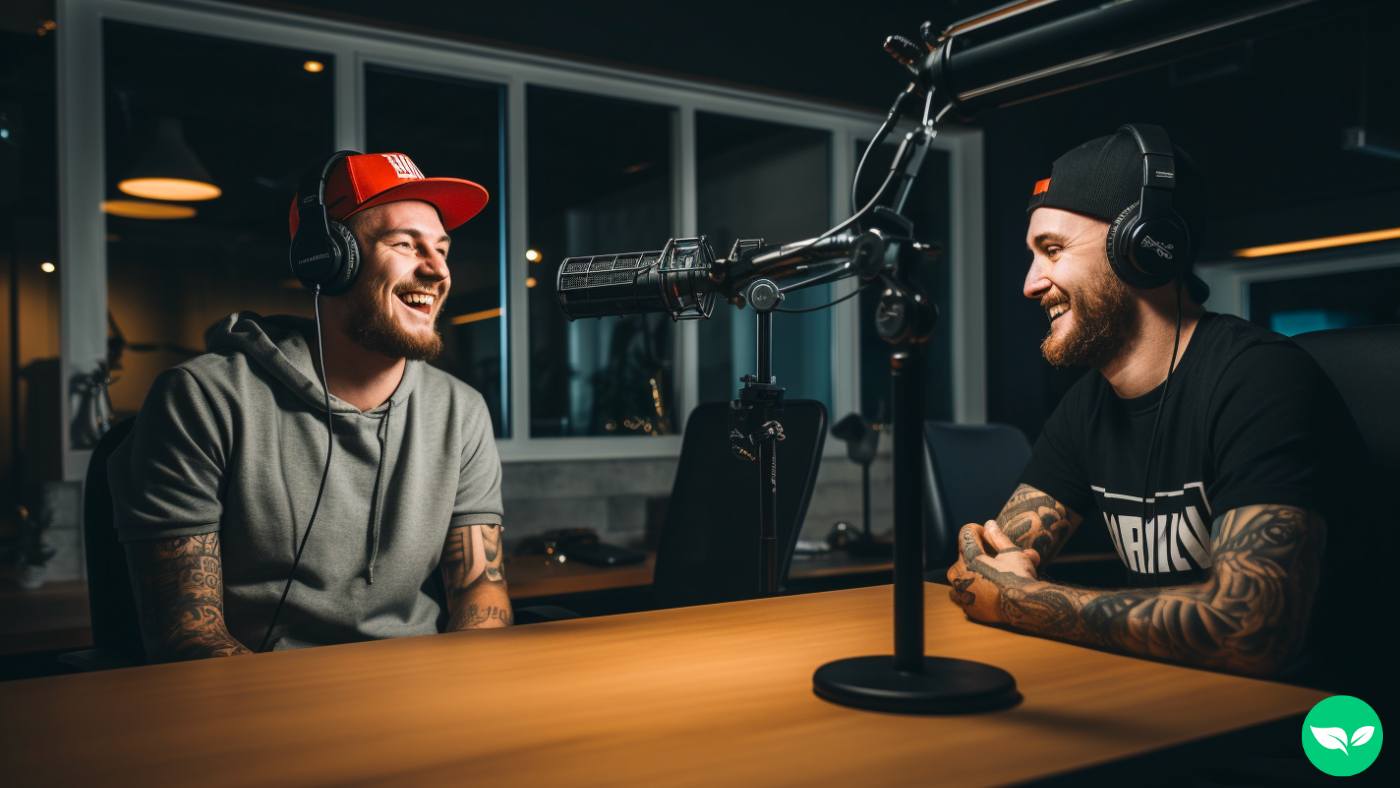
Our mission at DollarSprout is to help readers improve their financial lives, and we regularly partner with companies that share that same vision. If a purchase or signup is made through one of our Partners’ links, we may receive compensation for the referral. Learn more here.
Editor’s Note: This post was originally published on Breaking The One Percent by Mike Beatty from Make Time Online as part of our “Ask the Expert” interview series.
You probably know that more and more websites are created every day. With new content creators and bloggers jumping into the online world, it’s getting harder to stand out from the crowd.
Most people think that by being consistent and putting in more time and effort, they can eventually beat the competition.
But what if there was a genuine way that you could stand out? What if you could create 100% unique content that people could consume on their way to work, at the gym, or while making dinner?
Today, we’re going to hash out the 7 amazing benefits of having your own podcast and how you can start today.
Should you start a podcast if you have a blog?
Podcasts can be super valuable for any business, as you will soon learn.
However, they can also be a great way for content creators or bloggers to easily “repurpose” existing content to reach a new audience.
Podcasts are becoming more and more popular, and many people would prefer to listen to a podcast than read a long blog post. In fact, Google Trends suggests that interest in podcasts has exceeded that of blogs since the start of 2019.
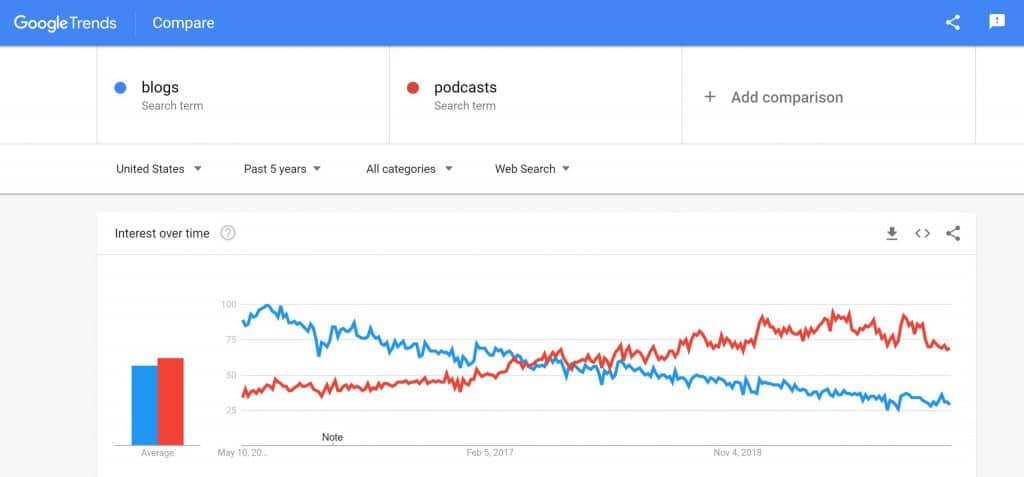
Just think about it…
If people can hear your voice and listen to you whilst having a cup of coffee, do you think they are more likely to get to know you and trust you compared to reading words on a screen?
This means they are going to be more likely to buy whatever your company offers.
This leads nicely onto…
7 Benefits of Having a Podcast
There are tons of benefits to starting a podcast. This list is not extensive but it highlights the main areas that could help your business or your blog.
And this is even without talking about getting your podcast sponsored or directly monetized…
1. Connect with leaders in your industry
You may have heard this before:
Your network is your net worth.
Whilst you may just see it as a silly quote that people overuse, it has a lot of truth to it, especially in business. The most successful businesses tend to have good relationships with other leaders in the same industry.
A podcast provides an opportunity to speak to experts within your industry who would never take your call otherwise. This can also help you…
Related: These Millennials Started Blogging 12 Months Ago and Already Make $1,000+ Per Month. Here’s How.
2. Learn more about a topic
Many people believe they cannot start a podcast until they understand everything about a certain topic.
While it obviously helps if you have some knowledge in the area, there will likely be areas that you will still be learning about. By taking your listeners through your own journey, it can actually help to connect with more like-minded people. This is also a great way to…
3. Become an authority in your field
If you want to build a brand, then a podcast is a great way to do this. Your personality comes across much more compared to writing and your accent will become part of your brand.
But just producing a podcast can instantly provide authority within your industry. It’s a great way to stand out and connect with listeners regularly.
4. Create new opportunities you hadn’t thought of
Podcasting can help to put your brand and name on the map. This also means people can find you in new ways. I’ve had some impressive people I haven’t even heard of asking to come on my podcast.
It’s also possible that people may invite you to work with them or even do some guest speaking, guest posting, or other forms of collaboration. Often, these are areas you may not have even considered before and can open up new income streams.
Related: How Bloggers in 7 Popular Niches Are Making Their Money
5. Get free stuff
This is definitely not a reason to start a podcast. But if this happens, it can be one of the best benefits of having a podcast.
This was something completely unexpected and unplanned for me, but I’ve had numerous courses or tools shared with me, just as a “thanks for sharing our message.”
6. Increase traffic
You may find that your audience from your podcast may be totally separate from your existing audience.
If you provide some show notes with useful links or content connecting to your podcasts, then you can also get new people visiting your existing website. This is another way for people to find other services or products that you provide.
7. Easy to create
If you already create content on a website or YouTube channel, the great thing is you don’t even need to put in much more work to create a podcast.
You can simply talk about the content from your blogs or use the audio from a YouTube video to create podcast content. It’s even possible to completely outsource this job to someone else, without needing to spend any extra time on it.
Podcasts don’t require a lot of equipment or tools to get started either. If you have a phone or a laptop, you can start a podcast right now.
Before we look at how exactly you can do this, let’s figure out what style your podcast should be.
Related: 7 Ways to Repurpose Your Blog Content and Get the Most Out of Every Post
The Two Main Types of Podcasts
There are many different podcast styles or genres, but really they fall under 2 main categories:
- Solo
- Interview
There are other styles such as:
- Multi-host shows (fits more under solo usually)
- Roundtables (could be either format depending on if the guests a regular or not)
So, what’s better?
There is no right answer, but if you are wanting to connect with more people and network, it’s likely you will choose an interview style.
Many podcasts use a bit of both having a guest on sometimes, and at others, going at it solo. Some podcasts will even have seasons focusing on a certain theme and taking a break until the next season.
The key is to make sure every episode serves your audience, the same way that all your content should.
How to Get “Experts” on Your Podcast
Now I can almost hear your mind saying, “This is all great in theory, but how am I supposed to get any experts on my podcast?”
That’s a great question, so let’s break it down a bit, shall we?
Where to find people to interview on your podcast
Here are some places you can find these “experts”:
- Your own network (people you may already be in contact with — the best approach)
- Facebook Groups
- Twitter, Instagram, Snapchat, etc.
- People releasing something i.e. new book or course (this is a great time to ask because they want the publicity)
- Ask your guests if they recommend anyone else
- Other podcasts you listen to
But the key is to use what you already know.
You may be super active on Twitter, Reddit, LinkedIn, or Instagram, so obviously that would be the best place to start. What I quickly realized is that I was already in contact with many people who would make great guests.
Remember, you don’t have to get the biggest “experts” straight away. They just need to know something that would help your listeners (and almost everyone’s story can help).
Related: How One Entrepreneur Build a Business Repurposing Podcasts into Blog Posts for Business Owners
How to ask for the interview
This is a really important step.
You’re probably already aware that sending an email to someone who has no idea who you are rarely gets answered.
I have found that getting to know the person, what they are currently working on, and if there’s any way you can genuinely help always works best.
I personally don’t believe that cold pitching someone is the best way to go about it.
So here are a couple of examples I have of asking people to come on my show in the past:
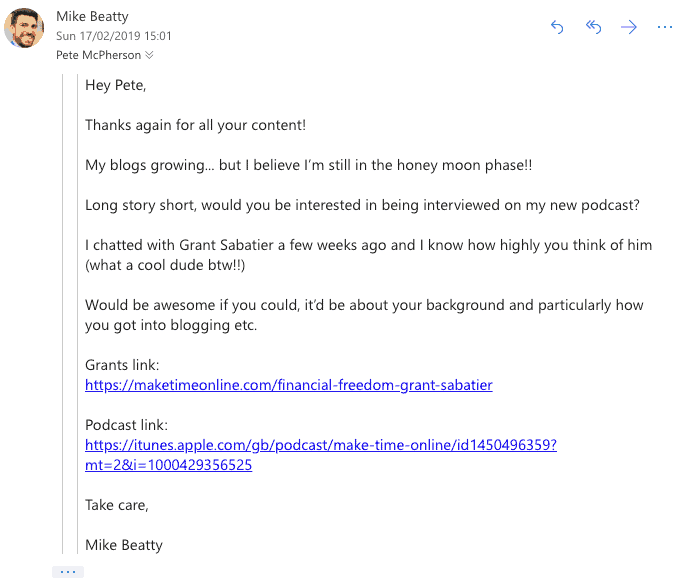
I had already emailed Pete McPherson a couple of times replying to his email sequences.
He always replied, so I knew I could reach him there.
I tried to keep it short and to the point and used Grant’s name, as I knew he had interviewed him before.
Funny story, I actually started the podcast because I reviewed Grant’s book Financial Freedom (read it if you haven’t already!). I asked for an interview and he asked me if I wanted it in written or audio format…go figure what I chose.
And this is how I got to have a chat with Jeff and Ben from DollarSprout:
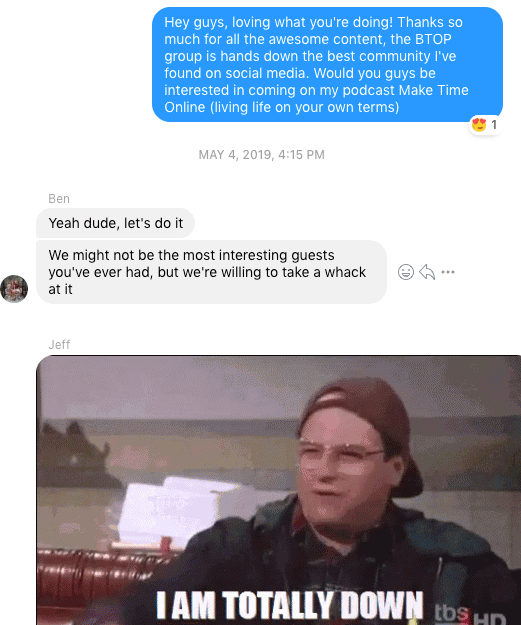
I had kind of already touched base with Jeff and Ben, and I had judged that flat out asking them may be the best approach to not waste their time.
Plus, I knew they hung out on Facebook because I was part of their awesome group.
Check out the chat here where they explain the story of how they went from nothing to $240k/month. Speaking to people like this is without a doubt one of the best benefits of a podcast.
Tips for getting guests
There are 7 key tips that have helped me to get more guest opportunities:
- Try to make contact with them before asking i.e. thank them for some work you liked, share their stuff, ask them a question, join their email list, etc.
- Find out where the person you are asking hangs out (email, Twitter, Facebook, Instagram, etc.)
- Be polite and get to the point (nobody has time to read an essay to figure out what you’re asking!)
- Replying to emails sent from them is a great way to get a higher response rate.
- Look out for emails from people that have been on other podcasts (it shows they are willing to go on podcasts)
- Follow up if you don’t get a response (max 3 attempts)
- Drop in the fact you have a podcast in your emails signature and any other outreach that you do
In fact, I have had a response from every person I asked if I had already been in contact with them (not the case for cold pitches).
Just remember to keep track of who you asked and when you asked them (I use a simple spreadsheet), and make sure to follow up with them if you don’t get a response.
Follow up about 2 weeks after you have sent the request and never send more than 3 requests in total. It just becomes needy and there are plenty more fish in the sea.
How to Start a Podcast
One of the biggest benefits of starting a podcast is how cheap and easy it is. Creating a blog can be super cheap, but there is always a bit of a learning curve setting that up.
And if you’re like me, you will be interested in finding free or cheap tools to help you do this for podcasting.
Now I’m about to show you how $108 and less than 2 hours can have your podcast set up and sounding as professional as NPR.
There are really only 3 steps to get your podcast out there:
- Choose your podcast hosting
- Record and edit your podcast
- Publish and connect your hosting to different podcast directories
Now, there are some different recommendations from different “gurus” on this. But all you really need is “hosting” to get your podcast out there into the real world.
Tools to Set Up a Podcast
So here are the main tools that are available. They are pretty much the cheapest options around and provide you with more than enough to produce a great-sounding podcast.
Hosting
- Podbean. $108 for the year and unlimited upload plan. I personally use it as it’s the most cost-effective with unlimited storage space. Use this tutorial on how to submit your podcast to different directories…this covers steps 1 and 3…two birds, one stone.
- Lisbyn. $5/ month for 50Mb [one of my podcasts averages around 45Mb for 45 minutes though]…or $15/ month for 250Mb.
- There are free hosting plans on platforms such as Anchor, but they are limited to what you can do and therefore not recommended (similar to website hosting).
Microphone
To be honest, any microphone will be better than your built-in one on your laptop, but it’s not a necessity.
Wearing headphones is important while recording (so you don’t get the echo from the laptop speakers). Any headphones will do.
The ATR-2100 is what gets recommended all the time:
- Just the microphone is around $79
- Stand with pop filter (stops the “P” noise being really loud) is around $19
How to Record the Podcast
- Ecamm recorder for Mac users on Skype for a one-time fee of $39.95 for lifetime access. You need something like this if you are interviewing someone.
- Try these out for Windows (if you are interviewing someone).
- Use any recorder like GarageBand, Voice Memos, or even Audacity (see next point) if it’s a solo podcast.
Software to edit and arrange the podcast
- Use Meetingbird to arrange times you’re available (it’s free and saves a lot of back-and-forth messaging)
- Audacity (Editing. It’s free, easy to use, and awesome)
- Levelator (Another handy free tool. It makes sure the “loudness” is equal from your end and the other person’s if it’s an interview-style)
In total, you’re looking at around $150 to get everything you need, plus whatever microphone you want. And it doesn’t need to look like a recording studio, this is what I look like on a podcast chat.
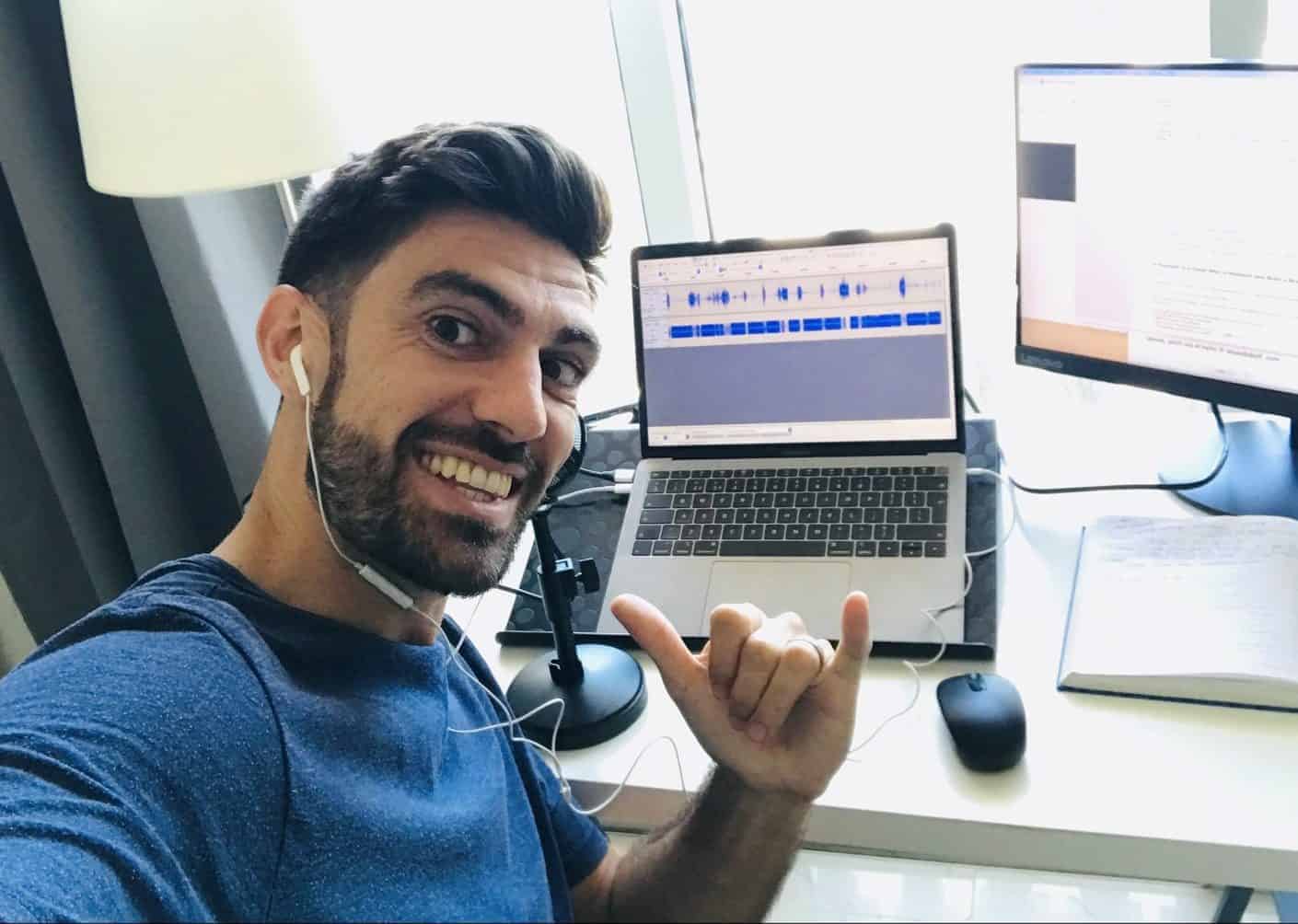 A quality podcast setup can affordably come in at less than $150. Photo courtesy of Mike Beatty.
A quality podcast setup can affordably come in at less than $150. Photo courtesy of Mike Beatty.
I thought this was going to be super complicated, but it actually took under 2 hours to get all of that set up.
Networking and Branding Made Easy
Here’s the truth: a podcast can do things for your business that you didn’t know were possible.
You can use it as a tool in any way you wish. Plus, it’s a great way to get up-to-date and important information about your business out there.
Yes, it can take time and effort, but you wouldn’t even be reading this article if you weren’t prepared for that. On the same note, it is possible to completely outsource a podcast if you already produce YouTube videos or are happy for someone else to read your blog posts.
By now you should know:
- The benefits of starting a podcast
- Different types of podcasts
- How to find the right guests for your podcast
- The software and tools you need to start
The reassuring part? It isn’t scary or intense to start a podcast. The fancy intros, sponsors, and sound effects are great if you want to spend time on them, but they aren’t needed to start a podcast that grows your business.
shares